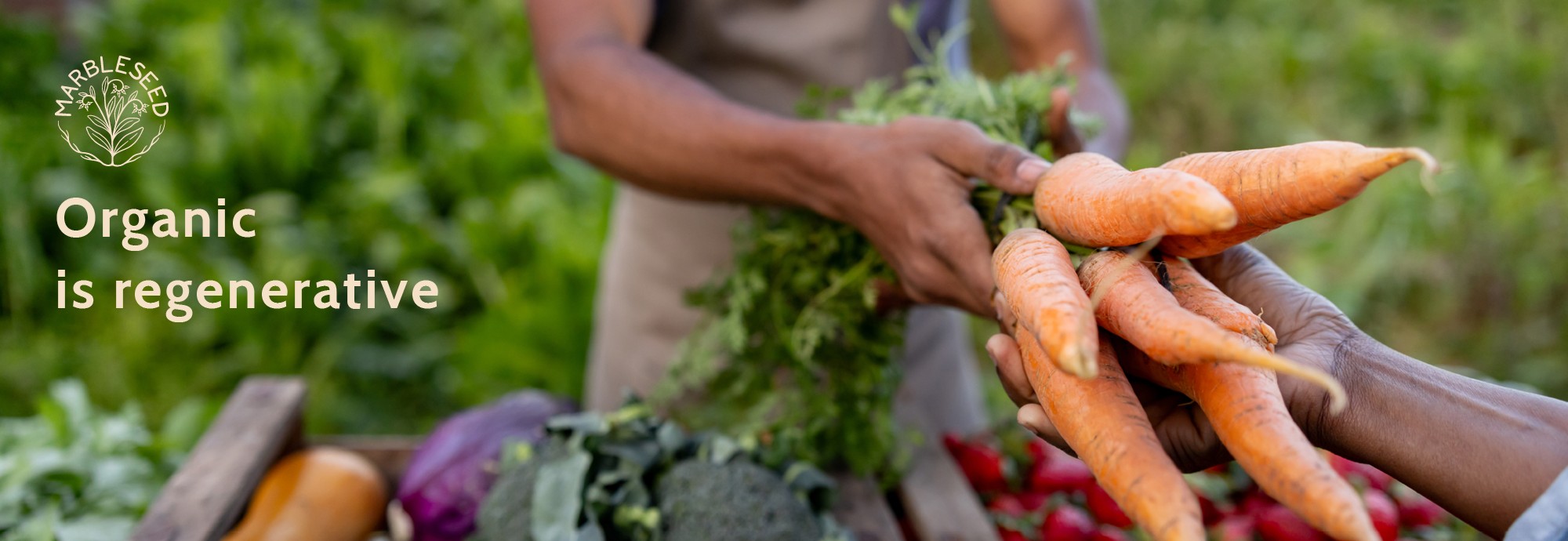Organic is Regenerative
Organic is regenerative. That’s right, Organic farming is inherently beneficial for soil and ecosystem health and combats climate change! While consumers often associate organic farming with simply not using synthetic pesticides, Organic is so much more than that. Organic is a holistic production method that promotes human, animal, soil, and ecosystem health. Organic farming can be a key tool in our arsenal to combat climate change, while also bolstering rural economies and promoting human health and wellbeing.
A strict process
If a product is “certified organic” it comes from a farm or handling facility that complies with USDA organic regulations. Only after an on-site and review by a USDA-accredited certifying agent can a business legally use the word “organic” or the USDA organic seal.
The process is strict, and farmers who have earned certification should not only be proud but help educate their prospective customers on the level of scrutiny their food has passed. As part of the certification process, a farmer provides a comprehensive plan that includes the land history of all fields; a fertility and nutrient management plan; a pest, weed, and disease management plan; and the origin, feed, and health care of livestock. In addition, they must report all products used on the farm, including dates and rates of application.
In other words, organic producers are required to use many of the practices that consumers associate with regenerative farming.
Growing demand and confusion
There is increasing awareness among consumers that our food system is directly tied to our personal health, as well as to the health of our shared environment. Synthetic inputs, such as the herbicide glyphosate and PFAS (aka “forever chemicals”) have been linked to cancer, while practices like excessive use of synthetic fertilizers and monocropping, are directly linked to erosion and water contamination
It makes sense that we want to feel assured that the products we put in and on our bodies are as clean and unprocessed as possible. Which is why, according to the USDA, there are more than 28 thousand certified organic farms and businesses in the U.S., and the organic industry is the fastest-growing segment of U.S. agriculture.

While the term “regenerative” is used by producers of all sizes and types to describe a wide range of food, textile, hygiene, and other products, there is no legally binding definition. Yes, there are many positive philosophical goals of regenerative, including a focus on carbon sequestration and social justice, but these are aspirational. In short, it's all too easy for “regenerative” to be used disingenuously in marketing and packaging.
Protecting what we have
Farmers fought hard for the organic label. Beginning in the early 1970s, organic certification was initiated at local and state levels. In 1990, Congress passed the Organic Foods Production Act to mandate a national standard.
As one of the oldest organic farming organizations in the country, Marbleseed is dedicated to the idea that organic is worth defending. It is not just a term but a movement of growers and eaters, of practices and principles, of elder farmers who fought for recognition and younger farmers who are passionate about carrying that work forward.
We believe that organic farming at its best – the way we believe the movement’s earliest adapters intended it to be – is the original regenerative. The latter would not be here without the former. We cannot lose the foundational strength of organic certification in favor of a word that is too often used to greenwash products. Together, let’s educate, strengthen, and defend “organic.”
A toolkit for farmers and organic advocates
We hope farmers and others will use our toolkit to educate consumers on the history and rigor behind the organic label.
DOWNLOAD TOOLKIT OVERVIEW & VIEW SUGGESTED COPY FOR SOCIAL CAPTIONS
ORGANIC IS REGENERATIVE TOOLKIT OVERVIEW
DOWNLOAD READY-TO-POST SOCIAL MEDIA GRAPHICS
MARBLESEED'S ORGANIC IS REGENERATIVE TOOLKIT
Marbleseed's Organic is Regenerative campaign is funded by the Organic Valley Farmers Advocating for Organic Grant Program . This work is adapted from Organic Farming Research Foundation's Organic is Regenerative Toolkit. Learn more here.
